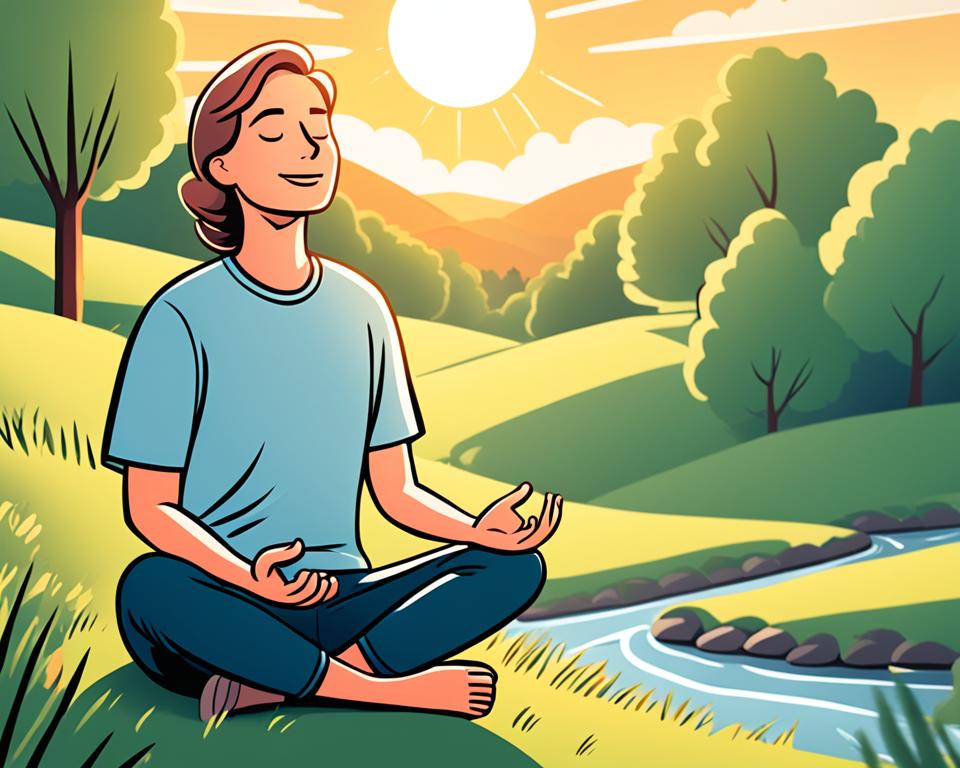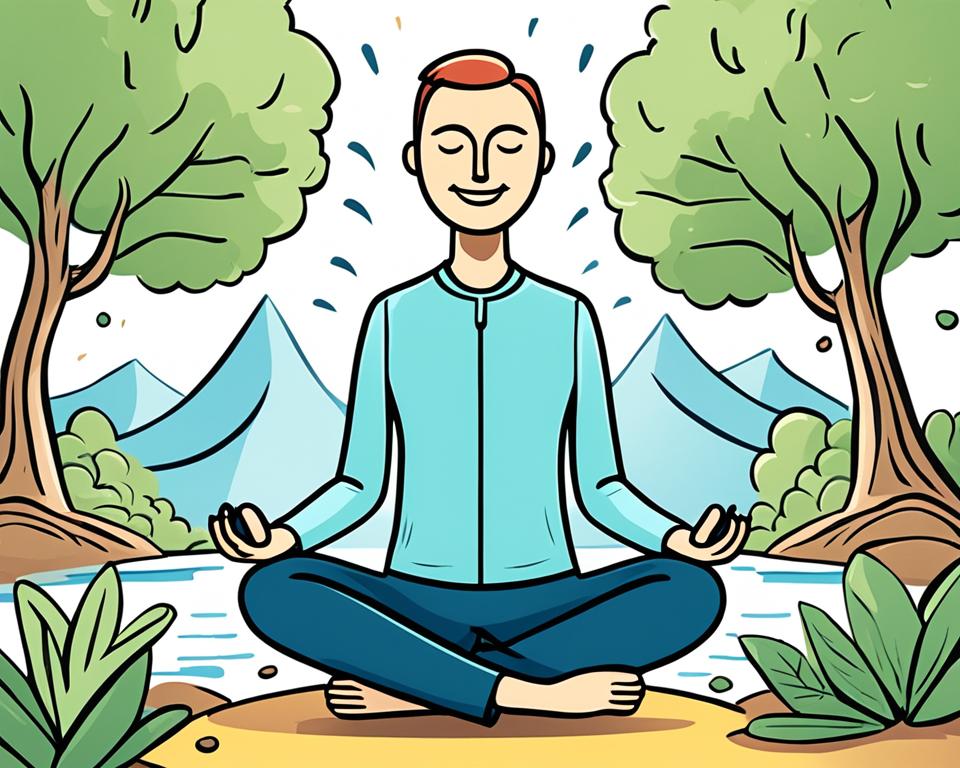Did you know that stress affects approximately 77% of Americans? With the fast-paced nature of modern life, it’s no wonder that stress has become a pervasive issue. However, there’s a powerful tool that can help you find solace in the chaos and bring calmness to your daily routine: mindfulness exercises for stress relief.
Mindfulness is gaining popularity for its ability to reduce stress and improve overall health. By practicing mindfulness, you can discover how to navigate stress better. This, in turn, elevates your sense of well-being.
Key Takeaways:
- Stress affects approximately 77% of Americans.
- Mindfulness exercises can help reduce stress and improve overall well-being.
- Practicing mindfulness regularly is crucial to experiencing its full benefits.
Swimming or Floating in the Water
Swimming or floating serves as a potent mindfulness exercise. It delivers both physical perks and stress relief. Imagine diving into chilled waters, feeling your body unwind and stress dissolve. This activity fosters relaxation, connecting you with your breathing rhythm.
Engaging in swimming or floating activates the whole body, enhancing flexibility as you navigate the water. Such movement promotes mindfulness, anchoring you in the now. The tranquil aquatic surroundings help filter out distractions, drawing you closer to inner peace.
While moving, notice the water’s gentle push, its support, and how your motions feel. Focus on your breathing; observe your chest’s rhythmic rise and fall. Tuning into these elements deepens mindfulness and amplifies its calming effects.
Begin this mindfulness practice at a nearby pool, lake, or beach. Whether you choose to swim or merely float, stay mindful of the moment. Revel in the water’s buoyancy, the soft lapping of waves, and the liberation it brings. Let stress wash away, welcoming tranquility into this journey.
Meditative Walking (Core Walking)
Some of the most straightforward exercises can lead to profound mental relaxation. Meditative walking, or core walking, stands out as one such practice. By making it a part of your everyday life, you can boost your mindfulness and find inner calm.
This approach involves a slow, intentional mode of walking. It lets you connect with each breath and every part of your environment. During your walk, concentrate on how you breathe, stand, and distribute your weight.
Walking mindfully triggers relaxation across your body by engaging your core muscles. A relaxed breath and balanced weight distribution help lessen tension and body pain. It also supports balance and stability, enhancing physical health.
Integrating meditative walking into your routine starts with finding a calm place for walking. Take some deep breaths to release tension before you begin. Focus on your body’s movements and how your feet feel as they move across the ground.
Utilize all your senses throughout this activity. Listen to nature’s sounds, like birds or the wind, and notice the sun or air on your skin. Be entirely in the moment, taking in every sight, sound, and feeling.

As you walk, keep your breathing easy and steady. With each step, free your mind from any distractions. If thoughts emerge, shift your focus back to your breath and how walking feels.
Meditative walking serves as an effective stress-reducing method. It offers mental and physical relaxation benefits. Including it in your day can strengthen your core, enhance body alignment, and nurture peace within.
Drinking a Cup of Tea
Turning any activity into a mindfulness exercise is possible if you fully engage with it. Mindful tea drinking means immersing yourself in every step, from preparation to enjoyment. It allows you to calm your mind and encourage relaxation by focusing on the present.
A hot cup of tea offers a peaceful break in your day. Notice the water boiling, the steam rising, and the sound of the cup meeting the saucer. Tuning into these details helps you stay grounded and fosters tranquility.
Once the tea is poured, take a moment to feel the cup’s warmth in your hands. Breathe in the aroma deeply, letting it soothe you. Embrace every sip, appreciating the tea’s flavor fully. This process aids in bringing you back to the now.
As you enjoy your tea, observe incoming thoughts or feelings without attaching to them. Let them drift away and bring your focus back to the present. This method of mindful tea drinking is a potent way to achieve relaxation and inner peace.

Benefits of Mindful Tea Drinking
“Tea is an ancient beverage that has been celebrated for its calming properties for centuries. By incorporating mindfulness into the act of drinking tea, you can amplify its stress-relieving benefits.”
Here are some benefits of drinking tea mindfully:
- Stress relief: Pausing to enjoy tea can reduce stress and create a relaxing moment.
- Sensory experience: Immersing your senses in the tea-drinking process can deepen your enjoyment and awareness.
- Focus and clarity: Paying close attention to your tea helps you stay present and clear-minded.
- Mindful pause: A mindful tea break provides a chance to meditate and disconnect from daily stresses.
- Connection: Sharing tea encourages mindful conversations and strengthens bonds with others.
Tea Varieties for Mindful Drinking
With so many tea varieties available, each offers unique flavors and health benefits. Consider these teas to enhance your mindfulness practice:
| Tea Variety | Flavor Profile | Potential Benefits |
|---|---|---|
| Green Tea | Grassy, earthy, subtle sweetness | Increase alertness, boost metabolism, promote relaxation |
| Chamomile Tea | Mild, floral, apple-like | Calming, aid in sleep, soothe digestion |
| Peppermint Tea | Cooling, refreshing, minty | Relieve indigestion, soothe headaches, enhance focus |
| Lavender Tea | Floral, aromatic, slightly sweet | Promote relaxation, reduce anxiety, aid in sleep |
| Rooibos Tea | Sweet, nutty, earthy | Rich in antioxidants, improve skin health, support digestion |
Explore different teas to discover those that best support your mindful drinking. The key is in the mindfulness and intention you bring to each cup.
Hiking or Connecting with Nature
Feeling overwhelmed by daily stress? Sometimes, escaping into nature is all it takes to find peace. Hiking or connecting with nature offers an ideal escape. It provides a break from our constantly connected, digitally-driven lives. It lets you fully engage with the present, using all your senses.
Embarking on a hike, you may traverse lush forests, sprawling meadows, or stunning mountain trails. This journey lets you shed your worries and soak in nature’s sights, sounds, and scents. The whisper of leaves underfoot, the touch of a gentle breeze, and the aroma of wildflowers join forces. Together, they craft a vivid, multi-sensory experience that can deeply enrich your well-being.
Studies have shown nature’s calming influence on our nervous system. This environment cuts down stress and promotes mental calmness. The fresh air, captivating views, and physical exertion boost endorphin levels. This flood of chemicals enhances feelings of peace and refreshment.
Whether your escape is serene forests, majestic mountains, or peaceful beaches, connecting with nature offers a break from daily chaos. Immersed in natural beauty, you find comfort, calm, and a fresh outlook on life. This connection affords a unique tranquility, offering solace and a revitalized perspective.
Overwhelmed? Need a mental refresh? Put on your hiking boots and explore the outdoors. Take a moment to just be. Inhale the clean air and marvel at nature’s beauty. Let your stress dissolve as you connect with the earth and the endless sky above.

| Benefits of Hiking or Connecting with Nature |
|---|
| Reduces stress levels |
| Promotes mental relaxation |
| Increases feelings of peace and rejuvenation |
| Enhances overall well-being |
Guided Meditation
Guided meditation is an effective way to relieve stress. It includes techniques like Yoga Nidra, where you relax physically but stay mentally alert. This method facilitates deep healing and eases stress.
With guided meditation, achieving calm and peace at any time becomes possible. It’s ideal for evenings or any moment that calls for relaxation. It serves as a peaceful retreat.
Benefits of Guided Meditation
Guided meditation enhances your well-being in various ways. It can reduce stress and anxiety, boost focus, raise self-awareness, encourage relaxation, and build emotional strength.
- Reduced stress and anxiety
- Improved focus and concentration
- Enhanced self-awareness
- Promotion of relaxation and peace
- Increased emotional resilience
Adding guided meditation to your daily schedule helps manage stress. It fosters a peaceful state of mind.

Getting Started with Guided Meditation
Beginning with guided meditation is straightforward. Here’s how to start:
- Find a quiet and comfortable space where you won’t be easily distracted.
- Close your eyes and take a few deep breaths to center yourself.
- Choose a guided meditation recording or app that resonates with you.
- Follow along with the meditation instructions, allowing yourself to relax and let go.
- Focus on your breath and the guidance provided, letting your mind and body unwind.
- After the meditation, take some time to reflect and notice how you feel.
Guided meditation takes practice to realize its full benefits. Be patient and enjoy the journey.
“Guided meditation is like having a supportive friend leading you through a journey of relaxation and self-discovery.”
Incorporating Guided Meditation into Your Routine
For the best results, integrate guided meditation into your daily life. Here are suggestions:
- Start your day with a short guided meditation to set a positive tone for the day ahead.
- Take a break during the day to recharge with a quick guided meditation session.
- Before bedtime, wind down with a soothing guided meditation to promote restful sleep.
Try various times and session lengths to discover what suits you. Staying consistent is crucial!
Conclusion
You’ve now mastered the mindfulness exercises guide for easing stress! These tools empower you to discover peace in your daily hustle. By diving into activities such as swimming, walking with awareness, enjoying tea with all your senses, exploring nature, practicing meditation, stretching, and breath focus, you’ll navigate stress more gracefully.
Mindfulness exercises are your allies in boosting well-being. They instill resilience and infuse your life with peacefulness. Emphasizing self-care and dedicating time for these practices is crucial.
Choose your stress-relief path wisely, may it be through the serenity of water, a mindful stroll, the ritual of tea, the embrace of nature, or the stillness of meditation. Heed your body’s and mind’s needs. Welcome each moment, release stress, and start a profound journey towards calmness and self-exploration.

